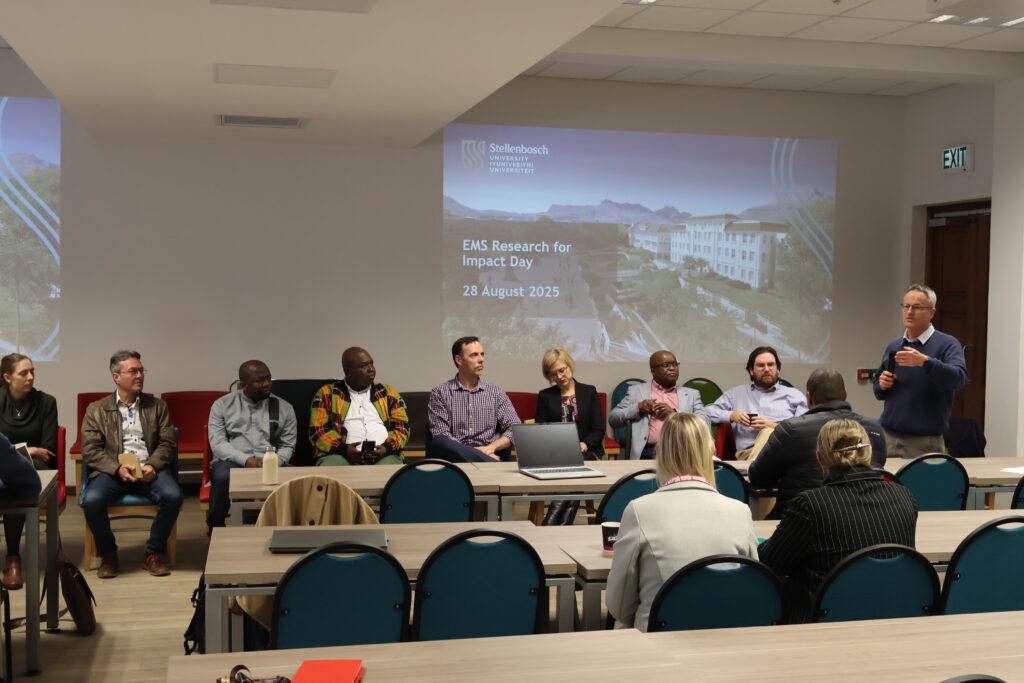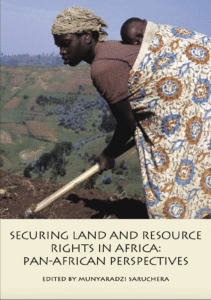
Representatives of various departments across the Faculty of Economic Management Sciences.
Academic research can be a powerful force for meaningful change in Africa. This was the message at the Research for Impact Day, which was hosted by the Faculty of Economic and Management Sciences (EMS) at Stellenbosch University.
Researchers, academics, students, and professional staff gathered on 28 August 2025 at Stellenbosch University to reflect on the role of research in society and to share insights into how scholarship can contribute to meaningful change.
“The purpose of Research for Impact Day is to highlight the importance of connecting research with real-world issues,” says Dr Munya Saruchera, Director of the Africa Centre for Inclusive Health Management. “Beyond generating academic outputs, research plays a central role in informing policymaking, strengthening communities, and shaping sustainable development.”
The event featured short presentations from faculty members and researchers, followed by a panel discussion and audience engagement. Participants were encouraged to exchange perspectives across disciplines and explore how evidence can be translated into practical outcomes.
Why research matters beyond the academy
 Among the presentations was Dr Saruchera’s “Securing Land and Resource Rights for Sustainable Development in Africa.” His presentation drew on findings from the Pan-African Programme on Land and Resource Rights (PAPLRR), an initiative that studied tenure security and land governance across Africa from 2002 to 2004.
Among the presentations was Dr Saruchera’s “Securing Land and Resource Rights for Sustainable Development in Africa.” His presentation drew on findings from the Pan-African Programme on Land and Resource Rights (PAPLRR), an initiative that studied tenure security and land governance across Africa from 2002 to 2004.
Dr Saruchera emphasised that secure tenure and property rights are critical foundations for development, particularly for Africa’s rural poor. Without these protections, communities remain vulnerable to exploitation, displacement, and cycles of poverty.
What the research revealed
The study identified several challenges and opportunities:
- Reforming broken systems: Current institutional frameworks for land rights are often ineffective and exclusionary
- Land and conflict: Unequal access to land and resources continues to fuel instability in many regions
- Privatisation pressures: Market-led reforms have frequently deepened rural vulnerability
- The role of civil society: Grassroots organisations and social movements are vital advocates but face ongoing financial and political obstacles
From research to real-world influence
What made the PAPLRR initiative significant was its reach beyond the academic community. The project produced 14 workshop papers, six policy briefs, and an edited book, shared widely and translated into Kiswahili, Kinyarwanda, Arabic, and French.
Its influence extended to high-level platforms such as the 2002 World Summit for Sustainable Development in Johannesburg, where the Lagos Declaration on Land and Resource Rights in Africa was presented. Even after the project’s formal conclusion, its findings continued to inform policy debates and advocacy across Africa.
Anchoring research in social impact
Dr Saruchera’s contribution illustrates how research can influence both policy and practice well beyond the university. The EMS Research for Impact Day has become an anchor event in the faculty calendar, providing a platform to learn from one another and to strengthen connections.
For the Africa Centre for Inclusive Health Management, the event also reflects its Research for Social Impact pillar. The Centre conducts inclusive, participatory, and collaborative research in strategic areas such as the socio-ecological dynamics of health, the social and commercial determinants of health, the political economy of health, and intersectionality in the health sector. The work contributes to broader initiatives, including Stellenbosch University’s Vision 2040, the UNAIDS 95-95-95 treatment targets, the United Nations’ Sustainable Development Goals, and Africa’s Agenda 2063: The Africa We Want.
By aligning staff and student research with these global and local priorities, the Africa Centre demonstrates how evidence-based inquiry can strengthen health systems, inform inclusive policy, and improve the well-being of communities across Africa.
*Several policy briefs have been written by Dr Saruchera with other authors on debating land reform and rural development:
- The context of land and resource rights struggles in Africa
- Nepad, land and resource rights
- Multilateral environmental agreements and land and resource rights in Africa
- Community conservancies in Namibia: An effective institutional model for commons management?
- Common property resources and privatisation trends in Southern Africa
